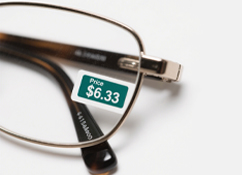What Happens to People Who Get Laser Eye Surgery for Myopia?
For many nearsighted people, laser eye surgery sounds appealing—no more blurry vision without glasses, or the daily hassles of wearing them. But fears linger: Is it safe? Will there be long-term issues? Could vision regress? This article breaks down how the surgery works, its safety, potential risks, and who’s a good candidate, to help you understand what to expect.
1. Laser Eye Surgery Lets You "Ditch the Glasses"—But Know This First
Laser eye surgery, formally called laser corneal refractive surgery, is a correction method mainly for adults with refractive errors. It uses lasers to reshape the cornea, helping light focus properly on the retina, so patients achieve clear unaided vision.
After surgery, vision typically matches the "ideal corrected vision" found in pre-op exams. For example, if you could see 1.5 with glasses before, you’ll likely hit that level without them—truly letting you ditch your glasses.
Research tracking 16.3 million patients found 97% achieved their expected unaided vision, with an average satisfaction rate of 95.4% (ranging from 87.2% to 100%). But here’s the catch: The surgery corrects existing myopia—it won’t prevent new vision loss later, nor does it treat high myopia-related eye diseases like retinal issues.
Some assume surgery makes them "immune" to myopia, then overdo screen time or gaming. Bad idea—this can let nearsightedness creep back. Even after surgery, you still need to protect your eyes.
2. Is Laser Eye Surgery Safe?
It’s safer than many realize.
Laser eye surgery emerged in the late 1980s, using excimer lasers to reshape the cornea. It quickly became mainstream thanks to high success rates. Then in 2004, femtosecond laser surgery arrived, using ultra-precise lasers to reshape the cornea—making the process even safer and more effective.
Worried about vision regressing? Most people won’t experience this, but a small number (usually those with high myopia or who don’t care for their eyes post-op) may have refractive regression (mild vision loss).
Another myth: "Surgery will make me go blind when I’m old." No science backs this. The surgery precisely reshapes the cornea and doesn’t affect internal eye structures. If seniors with a history of high myopia lose vision later, it’s usually from myopia-related issues like glaucoma, cataracts, or retinal problems—not the surgery itself.
3. What Risks Come With Laser Eye Surgery?
Like any surgery, there are risks, but they’re small and often manageable. Common post-op issues include:
Visual Disturbances
Transient or permanent glare or halos, especially in low light or at night. Some people notice this while driving after dark, but it usually improves or fades within months. No need to panic—just talk to your doctor if it worries you.
Reduced Contrast Sensitivity
This shows up on specialized tests but is rarely noticeable once you adjust.
Dry Eye Syndrome
The most common post-op discomfort. Artificial tears ease symptoms, and you’ll typically use them for 3–6 months after surgery
Needing Reading Glasses Earlier
Around ages 40–50, eyes naturally lose focusing ability (similar to presbyopia). Nearsighted people often don’t notice this because their myopia helps with close-up vision. After surgery (when you’re no longer nearsighted), you may struggle with small print—just like non-nearsighted adults. But vision training can help.
Most people adapt to these issues quickly. Don’t overcompare your experience to others—anxiety can make symptoms feel worse.
4. Who Can (and Can’t) Get Laser Eye Surgery?
Not everyone qualifies.
Good Candidates for Laser Eye Surgery
· Age 18+ ( exceptions include career requirements, severe refractive imbalance, or corneal conditions needing laser treatment).
· You and your family understand the procedure and sign informed consent.
· Stable vision: Myopia progression ≤50 degrees per year for at least 2 years.
· Refractive limits: Myopia ≤1200 degrees, astigmatism ≤600 degrees, hyperopia ≤600 degrees. For surface ablation, myopia should be ≤800 degrees. For SMILE (femtosecond laser surgery), total refractive error (myopia + astigmatism) ≤1000 degrees.
Who Should Avoid It?
Even if your prescription fits, you may not qualify if pre-op exams find:
· Suspected or confirmed keratoconus (corneal thinning) or other corneal expansion disorders.
· Active eye inflammation or infection.
· Insufficient corneal thickness: Central thickness <450μm; expected remaining corneal stroma after cutting <250μm (preferably 280μm); or remaining stroma <50% of original thickness.
· Severe dry eye.
· Severe eye structure issues (e.g., eyelid defects).
· Uncontrolled glaucoma.
· Cataracts affecting vision.
· Uncontrolled autoimmune or connective tissue diseases (e.g., lupus, rheumatoid arthritis, multiple sclerosis).
· Anxiety, depression, or other mental health conditions.
· Scarring tendency: These individuals are prone to excessive scarring, which could lead to corneal scarring and poor vision recovery.
Laser eye surgery is a mature, safe procedure that can significantly improve vision—but it’s not for everyone. Stay realistic: It’s not a "permanent fix"—poor post-op habits can still lead to vision loss. Protect your eyes, and you’ll enjoy the benefits long-term.











